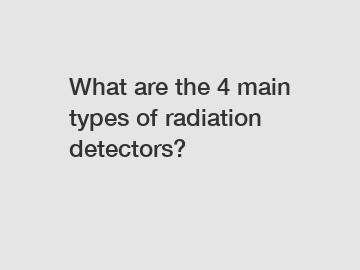What are the 4 main types of radiation detectors?
When it comes to detecting radiation, there are four main types of radiation detectors that are commonly used. Each type has its own unique characteristics and benefits, so it's important to understand the differences between them. In this article, we will break down the four main types of radiation detectors and explain how they work.
1. Geiger-Muller Counters:
One of the most common types of radiation detectors is the Geiger-Muller counter. This detector works by using a gas-filled tube that becomes ionized when radiation passes through it. The ionization produces a small electrical pulse, which is then amplified and counted by the device.

Geiger-Muller counters are relatively inexpensive and easy to use, making them a popular choice for both professionals and amateurs. They are suitable for detecting alpha, beta, and gamma radiation, but not suitable for measuring low levels of radiation accurately.
2. Scintillation Detectors:
Scintillation detectors work by converting the energy of incoming radiation into light pulses. This light is then detected by a photomultiplier tube, which amplifies the signal and produces an output that can be measured.
These detectors are more sensitive than Geiger-Muller counters and can measure lower levels of radiation accurately. They are often used in scientific research and medical imaging applications, where precision is important.
3. Ionization Chambers:
Ionization chambers are another type of radiation detector that detect radiation using the ionization of gas molecules. When radiation passes through the chamber, it creates a charge that is collected and measured. Ionization chambers are commonly used in health physics and industry for monitoring radiation levels.
One of the benefits of ionization chambers is their ability to measure a wide range of radiation levels accurately. They are also relatively simple in design and can be used in a variety of applications.
4. Semiconductor Detectors:
Semiconductor detectors are solid-state devices that use semiconductor materials such as silicon to detect radiation. When radiation interacts with the semiconductor, it creates electron-hole pairs, which produce an electrical signal that can be measured.
These detectors are highly sensitive and can detect low levels of radiation accurately. Semiconductor detectors are commonly used in nuclear medicine, environmental monitoring, and homeland security applications.
In conclusion, there are four main types of radiation detectors: Geiger-Muller counters, scintillation detectors, ionization chambers, and semiconductor detectors. Each type has its own unique characteristics and benefits, so it's important to choose the right detector for your specific needs. Whether you're a professional or amateur in need of a radiation detector, contact us for more information on where to purchase these detectors from a reliable supplier.
Remember, radiation safety is important, so it's essential to have the right tools to detect and monitor radiation levels effectively. Contact us now to find the best radiation detector for your needs.
Contact us to discuss your requirements of acousto-optic q-switch driver, radiation detection and measurement solutions, radiation detection and measurement solutions. Our experienced sales team can help you identify the options that best suit your needs.

Comments
0